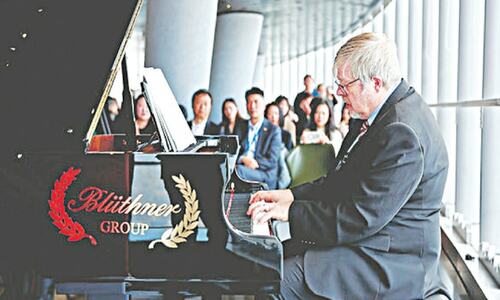 CAMBRIDGE, Feb 12: His beetle cabinet is back in his old college rooms, his home is a national treasure and the islands that led Charles Darwin to evolutionary theory are under threat from tourism two centuries after his birth.
CAMBRIDGE, Feb 12: His beetle cabinet is back in his old college rooms, his home is a national treasure and the islands that led Charles Darwin to evolutionary theory are under threat from tourism two centuries after his birth.
Celebrations for the 200th anniversary of the birth of the man whose book “On The Origin of Species” transformed how we see the natural world have captivated fellow scientists, royalty, religious leaders, historians, presidents, conservationists and tourist officials around the world.
David Attenborough, whose television programmes on the natural world have been watched by millions around the planet, provided a simple explanation for the draw of the bicentenary.
“Without Darwin, very little in the natural world makes sense,” Attenborough said. “Darwin turned natural history into a science.”
The 19th century naturalist’s influence was feted at his old university in Cambridge, at his home in Kent — now preserved for the nation — and in the Pacific islands off Ecuador where his theory began to take shape.
Several recent books include one that proposes Darwin’s hatred of slavery drove him to the theory of evolution, and two due this year come from Darwin expert John van Wyhe, who is in charge of Cambridge University’s Darwin Online project and the restoration of Darwin’s student rooms at Christ’s College.
Thousands of people have flocked to the biggest exhibition of his work at London’s Natural History where the star attractions are two unremarkable stuffed birds lying on a purple velvet cushion in a glass case at the entrance to the show.
The mockingbirds from the Galapagos Islands gave Darwin the first clues to his famous evolutionary theory. He noted that the birds varied slightly from island to island, suggesting that species with a common ancestry evolve over time.
“It’s the most important theory in modern biology and the background to all our scientists’ work,” said the museum’s Alex Gaffikin, who helped stage the exhibition.
LONESOME GEORGE: In the Galapagos, the struggle to find a mate for Lonesome George, the giant Pinta Island tortoise and last known survivor of his sub-species, is a modern illustration of Darwin’s theory.
In July, George’s keepers discovered he had mated with a female from a different sub-species, raising hopes of saving his own sub-species but 80 per cent of the eggs seem to be infertile.
The people who live on the once-idyllic islands off the coast of the South American country of Ecuador were celebrating in spite of a long-running debate over ecology vs tourism.
Leopoldo Bucheli, the mayor of Santa Cruz Island municipality said a Feb. 12 festivity was planned.
Tourists fly in to the volcanic archipelago every day. Internet cafes, trendy hotels and restaurants litter the main port, Puerto Ayora, where scores of tourists in beachwear mingle with blue-footed boobies and grey iguanas.
The United Nations has urged Ecuador to protect the islands from booming tourism and immigration and put them on the list of “in danger” heritage sites. Ecuadorean President Rafael Correa is mulling further tourism and immigration controls there.Darwin was acutely aware of how controversial his revolutionary ideas would be and dreaded the reaction of the Church, other scientists and the public. Revealing his theory to a few trusted friends felt like “confessing a murder”, he said.
Despite early hostility to Darwin’s ideas, church leaders said they now recognised him as one of Britain’s greatest scientists whose ideas co-exist well with religion.
“Darwin would be disappointed, perhaps even appalled, at the way he has been recruited as an icon of atheism,” said the Bishop of Swindon Dr Lee Rayfield, a trained biologist who speaks on science for the Church of England.
In America, where the teaching of evolution remains under attack from religious critics, the American Humanist Association were holding a luncheon at the National Press Club in Washington to discuss Darwin’s role in shaping religion and science.
Martin Rees, president of the Royal Society, the world’s oldest scientific academy, said Darwin’s influence “pervades contemporary culture more than any other figure in science”.
Back in Cambridge, Attenborough will be among a host of grand names at a dinner who will urge more be done to protect the Galapagos, just hours after Britain’s Prince Philip unveils a statue of the young Darwin at his old college.
Nearby, the leather club chairs sit cosily in front of the fire in his old rooms at Christ’s, and the table is set for dinner as it was in Darwin’s day.—Reuters















































Dear visitor, the comments section is undergoing an overhaul and will return soon.